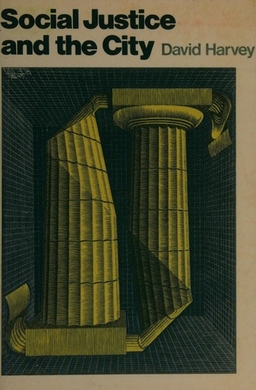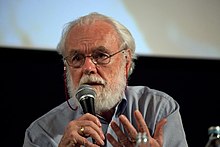Creative destruction is a concept in economics that describes a process in which new innovations replace and make obsolete older innovations. The concept is most readily identified with the Austrian economist Joseph Schumpeter, who derived it from the work of Karl Marx and popularized it as a theory of economic innovation and the business cycle. It is also sometimes known as Schumpeter's gale. In Marxian economic theory, the concept refers more broadly to the linked processes of the accumulation and annihilation of wealth under capitalism.
Accumulation by dispossession is a concept presented by the Marxist geographer David Harvey. It defines neoliberal capitalist policies that result in a centralization of wealth and power in the hands of a few by dispossessing the public and private entities of their wealth or land. Such policies are visible in many western nations from the 1970s and to the present day. Harvey argues these policies are guided mainly by four practices: privatization, financialization, management and manipulation of crises, and state redistributions.
Marxism is a political philosophy and method of socioeconomic analysis that uses a materialist interpretation of historical development, better known as historical materialism, to understand class relations and social conflict and a dialectical perspective to view social transformation. It originates from the works of 19th-century German philosophers Karl Marx and Friedrich Engels. As Marxism has developed over time into various branches and schools of thought, no single, definitive Marxist theory exists. Marxism has had a profound impact in shaping the modern world, with various left-wing and far-left political movements taking inspiration from it in varying local contexts.
In Marxian economics and preceding theories, the problem of primitive accumulation of capital concerns the origin of capital and therefore how class distinctions between possessors and non-possessors came to be.

Criticism of capitalism is a critique of political economy that involves the rejection of, or dissatisfaction with the economic system of capitalism and its outcomes. Criticisms typically range from expressing disagreement with particular aspects or outcomes of capitalism to rejecting the principles of the capitalist system in its entirety.

Metabolic rift is a theory of ecological crisis tendencies under the capitalist mode of production that sociologist John Bellamy Foster ascribes to Karl Marx. Quoting Marx, Foster defines this as the "irreparable rift in the interdependent process of social metabolism". Foster argues that Marx theorized a rupture in the metabolic interaction between humanity and the rest of nature emanating from capitalist agricultural production and the growing division between town and country.
Neil Robert Smith was a Scottish geographer and Marxist academic. He was Distinguished Professor of Anthropology and Geography at the Graduate Center of the City University of New York, and winner of numerous awards, including the Globe Book Award of the Association of American Geographers.
Marxist geography is a strand of critical geography that uses the theories and philosophy of Marxism to examine the spatial relations of human geography. In Marxist geography, the relations that geography has traditionally analyzed — natural environment and spatial relations — are reviewed as outcomes of the mode of material production. To fully understand geographical relations, on this view, the social structure must also be examined. Marxist geography attempts to change the basic structure of society.

Prabhat Patnaik is an Indian Marxist economist and political commentator. He taught at the Centre for Economic Studies and Planning in the School of Social Sciences at Jawaharlal Nehru University in New Delhi, from 1974 until his retirement in 2010. He was the vice-chairman of Kerala State Planning Board from June 2006 to May 2011.
The Isaac and Tamara Deutscher Memorial Prize is an annual prize given in honour of historian Isaac Deutscher and his wife Tamara Deutscher for a new book published in English "which exemplifies the best and most innovative new writing in or about the Marxist tradition." It has been ongoing since 1969.
Uneven and combined development, unequal and combined development, or uneven development is a concept in Marxian political economy intended to describe dynamics of human history involving the interaction of capitalist laws of motion and starting world market conditions whose national units are highly heterogeneous. The concept is used by Marxist scholars concerned with economic development. David Harvey is an advocate of the usefulness of this theory to reconstruct historical materialism on Modern terms. It is an accepted key concept in academic economic geography.
Andy Merrifield is a Marxist urban theorist.
The commodification of nature is an area of research within critical environmental studies that is concerned with the ways in which natural entities and processes are made exchangeable through the market, and the implications thereof.
The internal contradictions of capital accumulation is an essential concept of crisis theory, which is associated with Marxist economic theory. While the same phenomenon is described in neoclassical economic theory, in that literature it is referred to as systemic risk.

Capital: A Critique of Political Economy, also known as Capital, is a foundational theoretical text in materialist philosophy and critique of political economy written by Karl Marx, published as three volumes in 1867, 1885, and 1894. The culmination of his life's work, the text contains Marx's analysis of capitalism, to which he sought to apply his theory of historical materialism "to lay bare the economic laws of modern society", following from classical political economists such as Adam Smith, Jean-Baptiste Say, David Ricardo and John Stuart Mill. The text's second and third volumes were completed from Marx's notes after his death and published by his colleague Friedrich Engels. Das Kapital is the most cited book in the social sciences published before 1950.
Marxian economics, or the Marxian school of economics, is a heterodox school of political economic thought. Its foundations can be traced back to Karl Marx's critique of political economy. However, unlike critics of political economy, Marxian economists tend to accept the concept of the economy prima facie. Marxian economics comprises several different theories and includes multiple schools of thought, which are sometimes opposed to each other; in many cases Marxian analysis is used to complement, or to supplement, other economic approaches. Because one does not necessarily have to be politically Marxist to be economically Marxian, the two adjectives coexist in usage, rather than being synonymous: They share a semantic field, while also allowing both connotative and denotative differences.

The Grundrisse der Kritik der Politischen Ökonomie is an unfinished manuscript by the German philosopher Karl Marx. The series of seven notebooks was rough-drafted by Marx, chiefly for purposes of self-clarification, during the winter of 1857–8. Left aside by Marx in 1858, it remained unpublished until 1939.
Various Marxist authors have focused on Marx's method of analysis and presentation as key factors both in understanding the range and incisiveness of Karl Marx's writing in general, his critique of political economy, as well as Grundrisse andDas Kapital in particular. One of the clearest and most instructive examples of this is his discussion of the value-form, which acts as a primary guide or key to understanding the logical argument as it develops throughout the volumes of Das Kapital.
Crisis theory, concerning the causes and consequences of the tendency for the rate of profit to fall in a capitalist system, is associated with Marxian critique of political economy, and was further popularised through Marxist economics.

Social Justice and the City is a book published in 1973 written by the Marxist geographer David Harvey. The book is an attempt to lay out afresh the paradigm of urban geography, by bringing together the two conflicting theses of methodology and philosophy. Going against the grain of his previous book Explanation in Geography published in 1970, he argued that geography cannot remain disengaged, impartial and ‘objective’ at a time when urban poverty and associated ills were reigning high.






